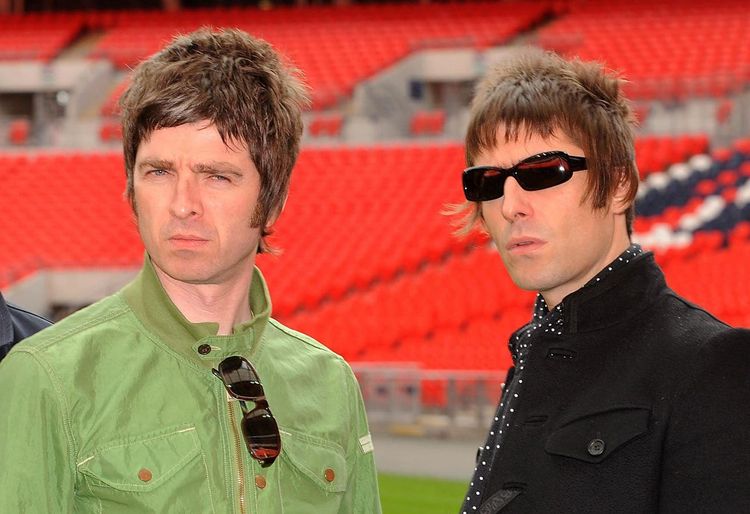Brits' Anger Over The SNL Oasis Sketch, Explained

LONDON, ENGLAND - OCTOBER 16: Noel Gallagher (left) and Liam Gallagher of Oasis pose at Wembley ... [+] Stadium on October 16, 2008 in London, England. (Photo by Samir Hussein/Getty Images)
Getty ImagesSaturday Night Live (SNL) just irritated a lot of British people online. In the “Weekend Update” part of the show’s latest episode, James Austin Johnson and Sarah Sherman played the oft-feuding Oasis brothers, Noel and Liam Gallagher.
You can watch the sketch, which explores the siblings’ antagonist relationship, here:
It didn’t take long after SNL’s broadcast for British people to hop online and express their displeasure over the skit:
The most interesting part of this story isn’t the visceral reaction from Brits to the SNL Oasis sketch though, it’s what that anger represents. Specifically, the divide between online culture and national culture.
Before that though, let’s dive into the UK’s thoughts about this skit.
How has Britain reacted to SNL’s Oasis sketch?The complaints from people in the UK boiled down to two main points. The first of these is the accents in the Oasis sketch.
Britain has a diverse range of accents and dialects that reflect deep-seated cultural nuances, whether that’s about class, area, or prejudices.
As George Bernard Shaw said: “It is impossible for an Englishman to open his mouth without making some other Englishman hate or despise him.”
In other words, accents are more important in the UK than most non-British people realize.
Oasis are well-known Mancunians, hailing from Manchester in North West England. The SNL Oasis parody, though, gives them a totally different accent. In specific, many people think it leans far harder on a London-centric accent — which is almost the opposite side of the country.
Although this irks a lot of British people, it’s arguably not the reason why the SNL Oasis sketch received so much attention. From Dick Van Dyke to Keanu Reeves, American actors struggling with UK accents isn’t a new trend. Brits have encountered these performances in many films or TV shows throughout their lives. It’s normal.
This makes the second big complaint about the SNL Oasis parody even more important. Specifically, the comedy itself.
To many British people, the skit just isn’t funny. It’s cringe-inducing and confusing.
Even Liam Gallagher himself holds a similar opinion:
Rather than simply saying the SNL Oasis sketch isn’t funny though, there’s a different way of looking at it.
The UK’s reaction isn’t about whether the skit is good or not, instead it’s a response to how the online world has altered how we think about humour on a global scale.
The SNL Oasis sketch: Local and international collidingThe internet made the world smaller. The rise of platforms like Netflix, YouTube, and Instagram means we experience cultural moments as a single entity, rather than in national blocks.
For example, over a quarter of a billion people watching a show like Wednesday would have been unthinkable before the rise of streaming. In days gone by, the program would’ve been syndicated across different networks in various countries, appearing at random times, and there would have been no way for people in other nations to discuss it with each other.
Yet the internet enables that. It made a show like Wednesday a global phenomenon, not just a national one.
This is echoed elsewhere with a rise in shared culture cues. Think about memes, for example. Whatever your nationality, you can appreciate Subtle Foreshadowing memes, because they use a shared language that was birthed on the internet.
The rise of memes and social media gives people the impression of a single, united online humr—but that’s simply not the case.
And this is the gap the SNL Oasis sketch fell down.
When it comes to comedy, there’s still a difference between what Americans and Britons find funny. Stephen Fry discusses it in this video:
According to Fry, what separates American and British comedy boils down to optimism, with people from the United States having more positivity infused into their comedy.
It can be argued that this sense of hope is reflected into SNL, a type of show that simply doesn’t exist in the UK.
As a weekly show filled with sketches, SNL populates its cast from improv groups, such as the Upright Citizens Brigade or the Groundlings. This creates a “Yes, and...” culture and makes simply getting through an episode of SNL a success. It bubbles with optimism.
The closest British equivalent to this sort of topical television are panel shows like Have I Got News For You (HIGNFY), something that is now on its 68th season. These generally find comedians sitting behind desks quipping about current affairs.
While any guest stars featuring on SNL perform with the cast, public figures that appear on HIGNFY are regularly mocked and held to account. The British show is far more acerbic and bitter.
To put that another way, there remains a clear difference between mainstream US and UK comedy. The idea of a shared online humor has no foundation here. These are entrenched national differences.
The British reaction isn’t just about the fact that the SNL Oasis sketch has inauthentic accents and is a bit silly. Instead, it’s a realization that despite the internet’s role in fostering a global culture, national differences very much remain.
It’s jarring to many Brits, the idea they can share so much with Americans, but at the same time be fundamentally different in specific and important ways.
This online reaction from the UK shows that while shared internet culture is getting stronger, it’s a long way from usurping national identities. Maybe, one day, that’ll happen. Until then, though, the Americans and British will just have to agree to disagree about the SNL Oasis sketch.



























